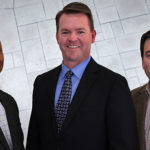MCALLEN—Messengers to opening business session of the Baptist General Convention of Texas annual meeting rejected a proposal that would have allowed Houston Baptist University to elect non-Baptist trustees, and they approved — with two amendments from the floor — a massive overhaul of Texas Baptists’ annual meeting.
Messengers on Nov. 8 turned aside a BGCT Executive Board recommendation that the state convention revise its agreement with Houston Baptist University, allowing HBU to elect a minority of non-Baptist Christian trustees.

HBU has related to the convention by special agreement since 2001. That agreement allows HBU to elect 75 percent of its own trustees, with the BGCT electing the remaining 25 percent. All trustees HBU elects must be Baptist but not necessarily from BGCT-affiliated churches.
The revised agreement would have allowed up to one third of the trustees elected by the university — one-fourth of the total board — to be non-Baptist Christians.
Ed Seay, chair of the trustee board and pastor of First Baptist Church in Magnolia, noted HBU is the only evangelical university in the Houston—soon to be the nation’s third-largest city. Seay emphasized the diverse population of Houston and the need to reach out to evangelical Christians in the city by providing them a minority voice on the school’s governing board.
Clyde Glazener, pastor of Gambrell Street Baptist Church in Fort Worth and a BGCT past president, expressed concern that denominations historically have lost institutions after they allowed similar moves.
“They never take the step without eventually losing” the school, he said. “It’s like a flat roof. It’s not a question of if it’s going to leak. It’s a question of when.”
Bob Fowler, a messenger from South Main Baptist Church in Houston and a past chair of the BGCT Executive Board, characterized the recommended change as “well-reasoned and appropriate.”
Sign up for our weekly edition and get all our headlines in your inbox on Thursdays
He emphasized the need for HBU to be able to relate effectively to other evangelical Christians, and he expressed appreciation for the way the school’s trustees came to the BGCT “with no demands, only a request” that non-Baptists be allowed a presence on the board.
But another past chair of the Executive Board, John Petty, pastor of Trinity Baptist Church in Kerrville, expressed his concern that allowing non-Baptists to serve on Baptist institutional boards is a “slippery slope” toward a diminished commitment to Baptist identity.
Pointing to the size of Union Baptist Association — larger than some state Baptist conventions — he said he found it hard to believe HBU could not find enough well-informed, engaged Baptists to serve on its board.
Seay insisted the university remains committed to its Baptist identity. The motion will “in no way diffuse our Baptist identity or direction,” he said.
But Andy Pittman, pastor of First Baptist Church in Lufkin, voiced concern that having non-Baptists on the board would “allow non-Baptists to set the agenda … hurting the future of Texas Baptists.”
Stacy Conner, pastor of First Baptist Church in Muleshoe, asked whether the revised agreement would allow non-Baptists to serve as officers on the trustee board.
Seay said the agreement included no restriction prohibiting it, but he deemed it unlikely.
However, Conner said, if non-Baptists eventually could rise to a position of leadership as officers on the board, their influence no longer could be considered a minority presence.
In other business, messengers approved an extreme makeover of the BGCT annual meeting focus and format — but not quite as extreme as a study committee recommended.
Kyle Henderson, pastor of First Baptist Church in Athens, chaired the committee appointed to study ways to increase participation at the annual event. He compared the annual meeting to a Thanksgiving family dinner that fewer and fewer people were participating in each year.
“Look around. There are a lot of empty seats around the family table,” he said, noting only 8.5 of the churches eligible to send messengers to the annual meeting attended the McAllen gathering. At mid-afternoon on the opening day, only 754 messengers had registered, along with 775 visitors.
The study committee recommended two measurable goals focused on the number of churches participating in the annual meeting rather than the number of people in attendance—double the percentage of participating churches by 2013 and involve every Texas Baptist church at least once every five years.
Key recommendations included:
• Showcase one area of ministry each year. Focus on a different theme annually, rotating between five key areas—evangelism/missions, education/discipleship, advocacy/care, Baptist identity and Baptist community. Every fifth year, schedule “The Gathering”—a three-day summer event that would bring together Texas Baptist ethnic groups and interest groups. The committee also recommended a multi-site event in 2017 using video simulcast technology, involving as many Texas Baptist institutions as possible.
• Plan beyond the current year. Coordinate and plan the annual meeting starting 18 months in advance of the event to secure speakers, gather resources, facilitate institutional cooperation and build momentum.
• Adopt a planning matrix with a clear purpose statement and values. The committee expressed its belief the purpose of the annual meeting should be “mobilizing, encouraging, informing and uniting Texas Baptists to accomplish the Great Commission.”
Several of the value statements — lengthen the meeting to three days, include a service project and schedule plenty of time for fellowship —sparked little discussion.
However, messengers rejected two proposals included in the list of values, turning aside proposals to limit business discussion to targeted breakout sessions and eliminating resolutions.
Steve Wells, pastor of South Main Baptist Church in Houston, characterized the recommendation about moving business discussions to breakout sessions and having votes without discussion in general sessions as “a bad plan,” and he made a motion amending the committee’s recommendations by removing that proposal. After extended discussion, the amendment passed.
Ken Coffee, a messenger from First Baptist Church in San Antonio, also made a motion amending the committee’s recommendation by removing the proposal that would have done away with resolutions.
Coffee noted resolutions provide a way for the BGCT to go on record regarding important issues — a tool that proves helpful when critics accuse the convention of not taking a stand on those matters.
He also voiced concern some would characterize elimination of resolutions as “one more way to keep people from voicing opinions.” After discussion, the amendment passed.
With those two issues out of the way, the committee’s proposal passed overwhelmingly.
In other business, messengers:
• Elected Victor Rodriguez, pastor of South San Filadelfia in San Antonio as president; Jerry Carlisle, pastor of First Baptist Church in Plano, as first vice president; and Sylvia DeLoach, veteran missions leader and member of First Baptist Church in Richardson, as second vice president.
• Approved a revised unification agreement with the Hispanic Baptist Convention of Texas.
• Granted recognized status to the Vietnamese Baptist Fellowship.
• Approved recommendations from a committee on border violence. They included a day of prayer and other prayer initiatives, retreats for Mexican pastors and spouses to offer them encouragement, and a partnership with the group No Mas Violencia that sponsors programs for schools, churches, civic officials and law enforcement.
John Hall of Texas Baptist Communications contributed to this article.














We seek to connect God’s story and God’s people around the world. To learn more about God’s story, click here.
Send comments and feedback to Eric Black, our editor. For comments to be published, please specify “letter to the editor.” Maximum length for publication is 300 words.